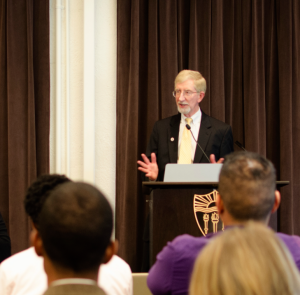New DCFS Director Emphasizes Leadership Skills in Social Work
April 11, 2013 / by Charli Engelhorn- Opinion
As new director of the Los Angeles County Department of Children and Family Services (DCFS), Phillip Browning is acutely aware of the need for strong leadership in social work.
During an inaugural address for the recently resurrected Los Angeles chapter of the Network for Social Work Management (NSWM) hosted by the USC School of Social Work, he emphasized the critical role managers and leaders play in various social work and social services settings.
“There are three things that are important for successful leadership: common sense, critical thinking, and accountability,” Browning said. “One of the most important things is to ask questions and look at things from others’ perspectives.”
Following his appointment at DCFS, Browning immediately implemented a strategic plan to promote those skills and improve services. Part of his plan included removing senior-level associates from their “ivory tower” and placing them in locations where they would interact with clients on a daily basis. Along with the location change, senior managers were given new assignments and responsibilities to facilitate innovative ideas and greater insight about their work. DCFS administrators were required to spend one night at a command post and ride along on cold calls and client home visits.
Browning also visited each office location in the region to introduce himself and become familiar with the staff. By fostering communication and bringing people back to the front lines, some of which had not visited a field office in years, he was able to foster engagement and involvement of staff members at all levels.
“Often times, people who have been in these positions for many years don’t ask the right questions,” he said. “They are used to directing, but there are always things coming out every day that we have to learn. Changing their routines and responsibilities gives them a chance to reset and think about things differently.”
Proper data collection also helps instill valuable common sense and critical thinking skills in social workers, Browning said. He meets monthly with his management team to evaluate their data in a detailed manner, including examining past cases and discussing what actions their departments would have taken. This often sparks a “light bulb” moment, he said, during which senior-level staff recognize something they could be doing differently or learn something new about their position and the nature of their work.
“Data is important. It gives us a look at what we need to do based on what we have,” Browning said. “It’s not just about detaining a child but the whole process involved. By thinking critically about the data, I believe we create opportunities to have an influence on the decisions being made.”
He noted that including practical exercises for critical thinking in social work programs would be more beneficial than just having a discussion about pertinent issues.
“Hindsight is great, but workers are often put in difficult situations, and negative outcomes often could have been prevented with some critical thinking and common sense,” said Browning. “We are in the business of humans, and how you treat people matters. Schools of social work can teach you a lot about human behavior, what is important to understand, and how to be judicious.”
Marilyn Flynn, dean of the USC School of Social Work and president of NSWM’s board of directors, said having Browning as the network’s first speaker was significant because he exhibits many of the qualities needed to advance the profession.
“In social work, we don’t have a historic role of taking a great leap forward, but what I like about [Phillip] is that he is willing to take risks on a larger scale,” Flynn said. “He has the ability to see an organization as a whole system rather than just individual parts. He thinks in terms of progression.”
Progression may be the key word for the local NSWM chapter. The board plans to expand the chapter during the next few years, collecting data and information along the way to develop a framework for a social work management concentration in graduate programs. By joining the network, USC hopes to expand its impact in shaping social work programs that will hopefully lead to a management certificate option embedded in the school’s curriculum.
A membership organization that brings together social workers from various human services organizations and in various managerial roles, the NSWM has a stated mission of deciphering the appropriate skills and characteristics required to bridge the gap between micro and macro management in social work.
Associate Dean and Clinical Professor Marlene Wong said bringing the network to USC is an important step not only for the school, but also for social work professionals in the Southern California region.
“We rarely have an opportunity to think and rethink about how we are doing things,” said Wong. “These events foster that by providing various agency managers the environment to think about the guiding principles of how we manage.”
To reference the work of our faculty online, we ask that you directly quote their work where possible and attribute it to "FACULTY NAME, a professor in the USC Suzanne Dworak-Peck School of Social Work” (LINK: https://dworakpeck.usc.edu)
